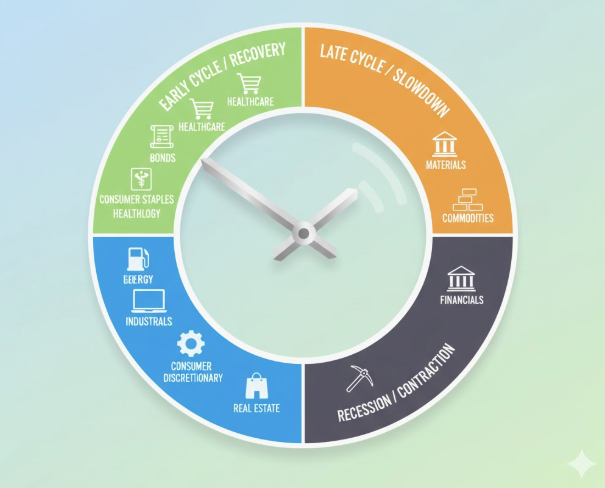Cyclical assets are those whose values fluctuate along with the pulses of the world economy. They appreciate when the economy is expanding. In a recession, they usually depreciate as well. Their price movements are basically echoes of the larger economy's cycle, thus cyclical assets expand in times of growth and contract in a downturn.
Non-cyclical or defensive assets either have price stability or appreciate regardless of economic conditions. Think of it in terms of staples of consumption and their production, or healthcare companies that produce goods or services that consumers "need" for every kind of economic condition.

Entire currencies or exchange rates can act in a cyclical manner in the Forex market. For example: when global trade or commodity demand rises, currencies like AUD, CAD and NZD appreciate. Defensive currencies like USD, JPY and CHF tend to appreciate over the time horizon during uncertainty.
Understanding Cyclical Assets in the Context of Forex Markets
The performance of an economy has a decisive influence on the strength of currencies. During episodes of strong global growth, the demand for goods, commodities and exports increase. This leads to an increase in the value of commodities currencies, which are currencies tied to the movements of commodities, such as the Australian Dollar (AUD), New Zealand Dollar (NZD), or Canadian Dollar (CAD).
Conversely, currencies like the US Dollar (USD), Japanese Yen (JPY), and Swiss Franc (CHF) are defensive currencies, attracting capital during global uncertainty when investors prefer safe havens. Traders will typically refer to these as “risk-on” and “risk-off” types of behaviour. In risk-on, currencies that are more growth focused will typically outperform other forms of currency. In risk-off, safe havens will appreciate relative to higher risk currencies.
The Relationship Between Cyclical Assets and Economic Indicators
Currency movements are often associated or grounded in macroeconomic indicators. GDP growth, PMI statistics, inflation, and employment numbers determine investor sentiment and correspondingly interest in a currency.
When a country's GDP increases, typically so does its currency, as investors expect higher returns. As the PMI prints above 50, it is indicative of expansion, thereby strengthening cyclical currencies such as AUD or CAD. The more sophisticated professional trader will be tracking economic indicators & macroeconomic performance alongside the gauge of the US dollar, known as the DXY.
Navigating Downturns: Defensive Assets and Portfolio Hedging
During times of economic slowdown, defensive or counter-cyclical assets can be used to help alleviate potential loss within a portfolio. Examples of defensive assets which appreciate during market turmoil include the currencies USD, JPY, and CHF, as well as assets like gold and government bonds.
From an amateur's perspective, it is easy to remember the concept of gold appreciating when other markets create downward pressure. An experienced trader may naturally transition away from AUD/USD to USD/JPY when they perceive a risk-off environment. In CFD trading, a trader can hedge by taking a long position in a defensive asset while going short on a cyclical asset. Having stop-loss orders in place along with diversification in a portfolio can help mitigate volatility in a down cycle.
In the market of 2022, as inflation accelerated through the year along with diminishing global growth, traders' preferences transitioned away from growth assets toward gold and the U.S. Dollar or U.S. Treasuries. Knowing how to both manage risk and downside when trading the cycle is just as important as trading the upside of the cycle. The key to long-term success is consistent survival.
For more info:-
online trading platform
forex trading platforms